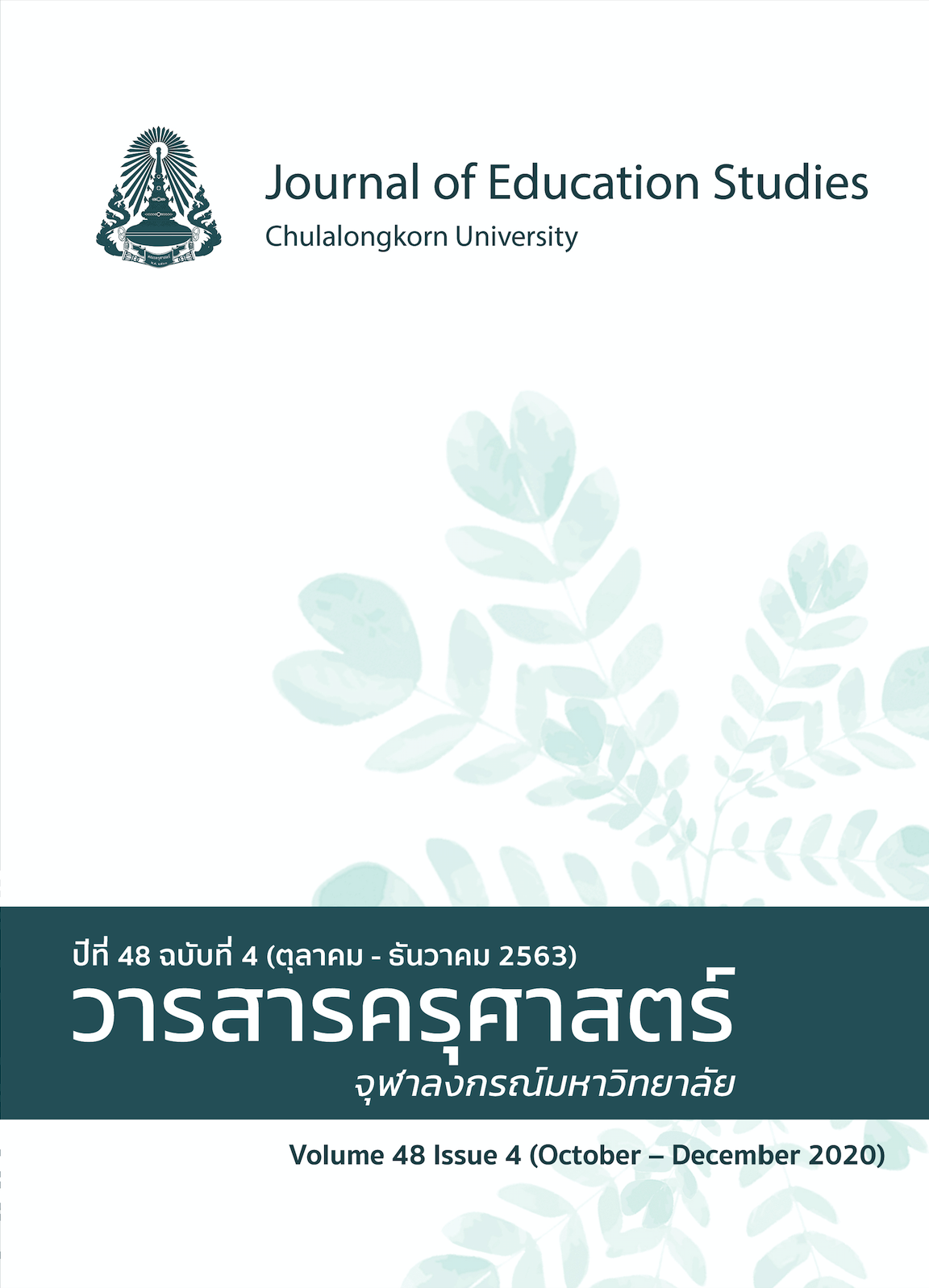English Literacy Curriculum Based on Content and Language Integrated Learning and Project-based Learning Approaches for Upper Secondary School Students
DOI:
https://doi.org/10.14456/educu.2020.11Keywords:
English literacy, content and language integrated learning, project-based learningAbstract
The purposes of this research were to develop an English literacy curriculum based on Content and Language Integrated Learning and project-based learning approaches for upper secondary school students. Samples were 36 M. 5 students of Triam Udom Suksa School of the South, Nakhon Si Thammarat. The duration of experiment was 18 weeks with the total of 36 hours. The research instrument was English Literacy Test. Data were analyzed by using mean, standard deviation, and t-test. Research findings found that a developed course curriculum consisted 7 steps which are: 1) Agree on a theme for the project; 2) Determine the final outcome; 3) Structure and plan the project; 4) Information gathering cycle; 5) Information compilation & analysis; 6) Information reporting; and 7) Evaluate the Project. After the experiment, ability mean score of control group was higher than before at significantly different level .05. The data showed that the students, teachers and School Director satisfactory scores were rated at high level. The recommendations made were such as the local content should be adapted to the users’ local content and the students should be motivated to conduct the project, inquire information, and draw their own potential to finish the project.
References
กระทรวงศึกษาธิการ. (2551). หลักสูตรมาตรฐานแห่งชาติสู่ชั้นเรียน : ปฏิรูปการเรียนรู้. ชุมนุมสหกรณ์การเกษตรแห่งประเทศไทย.
กระทรวงศึกษาธิการ. (2553). Roadmap จุดเน้นสู่การพัฒนาคุณภาพผู้เรียนเพื่อการขับเคลื่อนหลักสูตรการจัดการเรียนรู้การวัดและประเมินผล. ชุมนุมสหกรณ์การเกษตรแห่งประเทศไทย
กัยสิทธิ์ วงศ์จำปา. (2551). การพัฒนาหลักสูตรสถานศึกษา วิชาภาษาอังกฤษเพื่อการท่องเที่ยวนครพนม ชั้นมัธยมศึกษาปีที่ 4 โรงเรียนนาแกสามัคคีวิทยา สำนักงานเขตพื้นที่การศึกษานครพนม เขต 1. [วิทยานิพนธ์ปริญญามหาบัณฑิต ไม่ได้ตีพิมพ์]. มหาวิทยาลัยราชภัฏสกลนคร สกลนคร.
จุไรรัตน์ สุดรุ่ง. (2547). การพัฒนาหลักสูตรแบบเน้นกระบวนการทำโครงงานเพื่อเสริมทักษะภาษาอังกฤษสำหรับนักเรียนชั้นมัธยมศึกษาตอนปลาย [วิทยานิพนธ์ปริญญาดุษฎีบัณฑิต]. Chulalongkorn University Intellectual Repository (CUIR). http://cuir.car.chula.ac.th/handle/
123456789/3297
ชยพร กระต่ายทอง. (2552). การพัฒนารายวิชาเพิ่มเติมภาษาไทยแบบอิงมาตรฐานด้วยกระบวนการออกแบบย้อนกลับเพื่อเสริมสร้างความสามารถการวิเคราะห์และการอ่านเชิงวิเคราะห์ของนักเรียนมัธยมศึกษาตอนต้น [วิทยานิพนธ์ปริญญาดุษฎีบัณฑิต]. Chulalongkorn University Intellectual Repository (CUIR). http://cuir.car.chula.ac.th/handle/123456789/33099
เทพนคร ทาคง. (2546). การพัฒนาหลักสูตรตามแนวคิดที่อิงมาตรฐานในรายวิชาเสริมสมรรถภาพ ในการสอนภาษาอังกฤษสำหรับนักศึกษาครู [วิทยานิพนธ์ปริญญาดุษฎีบัณฑิต]. Chulalongkorn University Intellectual Repository (CUIR). http://cuir.car.chula.ac.th/handle/123456789/401
ธนชาติ หล่อนกลาง. (2550). การพัฒนารูปแบบการเรียนการสอนวัฒนธรรมท้องถิ่นตามแนวการสอนประสบการณ์ การอ่านแบบเสริมต่อการเรียนรู้เพื่อเสริมสร้างความสามารถ การอ่านภาษาอังกฤษเพื่อความเข้าใจและเจตคติต่อวัฒนธรรมท้องถิ่น ของนักศึกษามหาวิทยาลัยราชภัฏ [วิทยานิพนธ์ปริญญาดุษฎีบัณฑิต]. Chulalongkorn University Intellectual Repository (CUIR). http://cuir.car.chula.ac.th/handle/123456789/46714
ธมน ชัชวาลกิจกุล. (2555). การพัฒนากิจกรรมโครงงานภาษาอังกฤษเกี่ยวกับเรื่องท้องถิ่นจังหวัดนครปฐม เพื่อพัฒนาทักษะการอ่าน-เขียน สำรับนักเรียนชั้นมัธยมศึกษาปีที่ 5 โรงเรียนยอแซฟอุปถัมภ์ [วิทยานิพนธ์ปริญญามหาบัณฑิต]. Silpakorn University Repository : SURE. http://www.sure.su.ac.th/xmlui/handle/123456789/8132
บุรัชต์ ภูดอกไม้. (2554). การพัฒนารายวิชาภาษาอังกฤษเชิงวิชาการตามแนวคิดการเรียนแบบบูรณาการเนื้อหา และภาษา เพื่อเสริมสร้างทักษะการอ่านและเขียนของนักศึกษาปริญญาตรี [วิทยานิพนธ์ปริญญามหาบัณฑิต ไม่ได้ตีพิมพ์]. จุฬาลงกรณ์มหาวิทยาลัย.
บุญสม ทับสาย. (2549). การพัฒนารูปแบบการเรียนการสอนเพื่อพัฒนาความสามารถในการพูดภาษาอังกฤษเพื่อการสื่อสาร การสืบสอบและการจัดการการเรียนรู้ โดยอิงทฤษฎีถ้อยความและแนวคิดการเรียนรู้ด้วยการนำตนเอง สำหรับนักเรียนมัธยมศึกษาตอนปลาย [วิทยานิพนธ์ปริญญาดุษฎีบัณฑิต]. Chulalongkorn University Intellectual Repository (CUIR). http://cuir.car.chula.ac.th/handle/123456789/56741
รุ่งระวี สมะวรรธนะ. (2553). การพัฒนารูปแบบการเรียนการสอนสุขศึกษาโดยใช้ภาษาอังกฤษเป็นสื่อตามทฤษฎีการเรียนรู้เน้นประสบการณ์และแนวคิดการบูรณาการเนื้อหากับภาษา เพื่อเสริมสร้างพฤติกรรมสุขภาพและความสามารถในการสื่อสารเป็นภาษาอังกฤษของนักเรียนมัธยมศึกษาตอนต้น [วิทยานิพนธ์ปริญญาดุษฎีบัณฑิต]. Chulalongkorn University Intellectual Repository (CUIR). http://cuir.car.chula.ac.th/handle/123456789/21321
วรพร สุนทรวัฒนศิริ. (2543). การพัฒนาหลักสูตรการเขียนภาษาอังกฤษเพื่อการสื่อสารธุรกิจตามหลักการจัดการศึกษาแบบเน้นผลการเรียน สำหรับนักศึกษาสาขาบริหารธุรกิจวิชาเอกภาษาอังกฤษ สถาบัน เทคโนโลยีราชมงคล [วิทยานิพนธ์ปริญญาดุษฎีบัณฑิต ไม่ได้ตีพิมพ์]. จุฬาลงกรณ์มหาวิทยาลัย.
สถาบันทดสอบทางการศึกษาแห่งชาติ (องค์การมหาชน). (2559). คู่มือการจัดสอบทางการศึกษา ระดับชาติ ขั้นพื้นฐาน (O-NET) ชั้นประถมศึกษาปีที่ 6 ชั้นมัธยมศึกษาปีที่ 3 และชั้นมัธยมศึกษาปีที่ 6. สถาบันทดสอบทางการศึกษาแห่งชาติ (องค์การมหาชน) .
สรญา สาระสุภาพ. (2553). การพัฒนารูปแบบการเรียนแบบเครือข่ายสังคมผ่านระบบออนไลน์ด้วยทฤษฎีการเรียนรู้เชิงสถานการณ์เพือเสริมสร้างความตระหนักระหว่างวัฒนธรรมของผู้เรียนภาษาต่างประเทศ [วิทยานิพนธ์ปริญญามหาบัณฑิต]. Chulalongkorn University Intellectual Repository (CUIR). http://cuir.car.chula.ac.th/handle/123456789/19364
อมรรัตน์ วัฒนาธร. (2547). การวิจัยแบบร่วมมือที่ใช้ชุมชนเป็นฐานในกระบวนการพัฒนาหลักสูตร : กรณีศึกษาหลักสูตรเศรษฐศาสตร์ระดับประถมศึกษาที่บ้านถวาย จังหวัดเชียงใหม่ [วิทยานิพนธ์ปริญญาดุษฎีบัณฑิต]. Chulalongkorn University Intellectual Repository (CUIR). http://cuir.car.chula.ac.th/handle/123456789/64314
ภาษาอังกฤษ
Aronoff, M. (1994). Spelling and culture. In W. C. Watt (Ed.), Writing systems and cognition (pp. 67-87). Kluwer.
Bell, J. (1990). TESL talk: ESL literacy. A Journal for Teacher of English as a Second Language, 20(1), 12-18.
Bender, W. N. (2012). Project-based learning: Differentiating instruction for the 21st century. Corwin.
Coyle, D. (2005). CLIL: Planning tools for teachers. University of Nottingham.
Jonassen, D. H. (1991). Evaluating constructivist learning. Educational Technology, 28(11), 13-16.
Hargis, J. (2005). Collaboration, community and project-based learning – Does it still work online?. International Journal of Instructional Media, 32(2), 157-161.
Meltzer, J., & Jackson, D. (2010). Guidelines for developing an effective district literacy action plan (Version 1.1). Massachusetts Department of Elementary and Secondary Education and Public Consulting Group.
SRI International. (2000). Silicon Valley challenge 2000: Year 4 report. Joint Venture, Silicon Valley Network.
Stoller, F. L. (2002). Project work: A means to promote language content. English Teachers’ Journal (Israel), 54, 9-17.
Downloads
Published
How to Cite
Issue
Section
License

This work is licensed under a Creative Commons Attribution-NonCommercial-NoDerivatives 4.0 International License.




